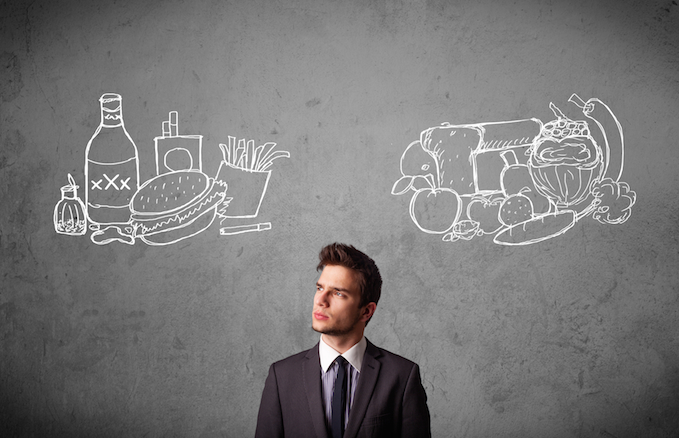Should You Do A Dirty Bulk?

When someone wants to put on strength and muscle mass, they typically go on what is known as a ‘bulking phase’.
Basically, this just means that they’ll adjust their diet so that they are consuming more calories than they are burning, thereby creating a daily calorie surplus.
When done correctly, this will allow them to gain strength, size, and muscle mass.
However, bulking is often not as easy as it sounds…
In fact, tons of people have a real issue gaining weight.
They just aren’t able to eat enough clean food each and every day to consistently put on mass.
For these people, one possible solution to this problem is to do a ‘dirty bulk’ instead. Let’s take a few minutes to look at what this actually entails.
What Is Dirty Bulking?
A dirty bulk differs from a clean bulk, in that you are not concerned with the quality of the foods you are eating.
Instead, you are just trying to get those calories in, whatever way that you can!
This leads to start gorging themselves on fast food, pizza, and other junk, in the hope of taking in a sufficient number of calories to put on mass.
Does this work?
Well, in a very limited sense – that is, purely in terms of gaining weight – dirty bulks are undeniably effective.
I personally know of many people that have been successful with this dietary strategy.
That being said, there are certainly other sides to this story…
To give you a better sense of whether or not you should consider doing a dirty bulk, we’ll walk through the pros and cons of this specific approach.
The Pros Of Dirty Bulking

It’s easy to get lots of calories.
As most of us know, typical ‘bad’ foods often contain a lot of calories.
It is not difficult to take in 1000s of calories in one sitting by eating pizza, fries, or fried chicken.
In fact, it would be hard not to consume that many calories of these particular foods!
If you eat mostly foods like this, it becomes incredibly easy to maintain a calorie surplus.
Compare this to a clean bulk, where you are relying on foods likes rice, potatoes, and other wholesome foods, to get your calories.
These clean foods just aren’t generally as calorie dense as the dirty ones – so in this limited sense, dirty bulking is indeed an easier approach.
It can be pretty damn fun.
I would be remiss if I didn’t mention this point, so here it goes…
Dirty bulking can be a whole lot of fun!
You are pretty much giving yourself carte blanche to eat whatever you want for a period of time.
This means that no foods are off limits – so you eat as much of fatty, calorie-dense, shitty foods as your little heart desires.
Water? Who has the time for that. I’m gonna have another milkshake instead.
Is this healthy in the long term?
Obviously not, but we’ll get to that in a second…
It can be a cheaper option.
When you look at the price of low-quality, high-calorie junk food, it is often significantly cheaper purely on a calorie basis.
That is, for any given quantity of calories that you’re eating, you are going to be spending less money with a dirty bulk than with a clean bulk.
Yes, this isn’t always the case, but in many cases it definitely is.
It can be a weight off your mind.
Let’s face it – thinking about the nuances of dieting takes mental energy and time.
You have to figure out what you’re eating, make sure that you’ve purchased everything you need, cook your meals in advance, etc.
All of this is eliminated when dirty bulking.
Your main goal each day is to just eat a ton of food, regardless of where it comes from.
This requires very little thought or preparation – especially when compared to the alternative.
The Cons Of Dirty Bulking
It is easy to put on too much fat.
The downside to any bulking phase is that you’ll put on fat.
Yes, if you are eating at a calorie surplus, this will happen – even if you are doing everything perfectly!
However, the specific amount of fat that you put on depends on various different factors.
And one of the biggest factors is, you guessed it, the amount of additional calories you are taking in each day, over your TDEE (Total Daily Energy Expenditure, or how many calories you burn each day)..
With dirty bulking, it is extremely easy to take in significantly more calories than you actually need when bulking.
Yes, there are limits to how many calories you should get while bulking, despite what some practitioners of modern broscience will tell you.
You see, you can only put on so much muscle each week, as a natural weight lifter.
If you’re new to lifting, you’ll be able to put on more muscle each week than if you’re an experienced lifter – but the fact remains, the amount of muscle you can feasibly put on each week is capped.
So what happens to the calories you eat in excess of that?
Well, they ultimately get stored as fat.
In my opinion, a primary goal of bulking should be maximizing muscle gain while minimizing fat gain. Unfortunately, dirty bulking makes this more difficult to do – simply because it is far too easy to eat absolutely disgusting quantities each day with this approach.
It isn’t a healthy approach.
If you care about your general health, then you aren’t doing yourself any favors by dirty bulking.
Yes, I know, it is only for a limited time – but if it becomes your go-to strategy every time you want to gain some muscle, it may negatively impact your health over time.
The bottom line is that if you subsist off McDonalds-quality foods during your bulks, you’ll be taking in absolutely massive quantities of saturated fats, sodium, and various dodgy additives.
In addition, you won’t be getting sufficient amounts of other important micronutrients in your diet.
It’s harder to maintain good macros.
As I briefly touched on before, the composition of your calories matters when bulking.
And by this I mean how many of them are coming from carbs, fats, and proteins – and in what specific ratios.
Unfortunately, due to the macro-nutrient composition of lots of dirty foods (high fats and carbs, low protein), it can be difficult to achieve anything close to an ideal ratio.
Instead, you’ll find it fairly difficult to get adequate protein, as a percentage of your total diet, if you rely primarily on these foods during your bulk.
It may make you feel like shit.
There is no doubt about it: what you eat greatly determines how you feel.
When you eat clean, nutritious foods, you generally tend to feel better.
Conversely, when you eat like crap, you tend to feel more sluggish overall.
Well, if you do a dirty bulk – eating mostly junk food for your calories – then you may not feel very good day to day.
Indeed, many people report feeling more tired and lethargic when dirty bulking (myself included).
And, of course, if you don’t feel your best, your workouts are likely to suffer as well, meaning that you may not maximize your strength/muscle gains either.
So Is Dirty Bulking A Good Idea?

In my opinion, it doesn’t have to be one extreme or the other. Like many things in life, a black and white approach isn’t going to be the best…
Yes, in theory, it is obviously ideal if you only eat clean foods when you’re bulking, in order to get the appropriate number of calories and hit your macro targets.
However, as many people have found, this can be tough to do each day.
So, here’s what I recommend:
Try to have the majority of your calories come from cleaner foods during your bulk – but definitely leave room for some ‘dirty’ ones too.
This means that you can have, say, 80% of your bulking calories coming from clean foods, whereas the remaining 20% can come from dirtier, junky foods.
And, if you do find that you’re too low in calories on any given day, I would say that it is better to fill in those remaining calories with dirtier foods, instead of failing to hit your calorie goals.
I should also mention that if you’re considering doing a dirty bulk primarily as an easy way to take in enough calories each day, I would suggest looking into incorporating some calorie dense, healthy alternatives instead.
Nuts are a fantastic source of calories, and it is easy to eat hundreds of calories of peanut or almond butter without even trying.
At the end of the day, however, regardless of which style of bulking you choose to do, you should be careful not to eat too many calories over your surplus.
You are at a much greater risk of doing this on a dirty bulk, for the reasons mentioned above, but you have the potential to do this when clean bulking as well.
The last thing you want is to have a massive percentage of your weight gain come from fat, and then have to waste time and energy cutting it all down again.
For that reason, whether you decide to do a clean bulk, a dirty bulk, or something in-between, I would advocate employing a slow bulking approach and avoiding massive weight gain/weight loss cycles entirely.
But that is a subject for another article…